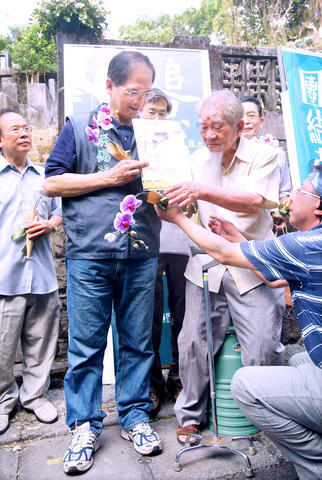Pan-blue and pan-green politicians yesterday paid tribute to Taiwanese democracy pioneer Chiang Wei-shui (蔣渭水) to mark the 76th anniversary of his death.
A physician and literature lover, Chiang was the founder of the Taiwan Culture Association (台灣文化協會) and the Taiwan People's Party (台灣民眾黨), the country's first political party.
Born in 1891 in Ilan County, in 1921 Chiang launched the nation's first large-scale cultural enlightenment movement when he organized the Taiwan Culture Association.

PHOTO: CNA
Chiang said that he sought to "uproot Taiwanese intellectual malnutrition."
He also organized the New Taiwan Alliance and the Taiwanese Labor Alliance in a quest for a more liberal and independent state.
Chinese Nationalist Party (KMT) presidential candidate Ma Ying-jeou (
Ma said there was no need for the pan-blue and pan-green camps to wrangle over Chiang's stance on the issue of independence.
"He earned respect from [his] next generation for his contribution to Taiwanese politics, culture and society between 1921 and 1930," he said. "Therefore, we need not make excessive inferences and associations [about his political stance] because that would only cause unnecessary harm to his memory."
"Chiang was a great man not only because he resisted the colonialism of Japan, but also because he pushed cultural enlightenment and social reform," he said.
Accompanied by Chiang's nieces, Ma also read a poem written by poet Yang Tu (楊渡), who serves as commissioner of the KMT's Culture and Communication Committee.
"Take care of those who suffer; help those who hate each other become reconciled; offer friendship to those who are lonely. Let us have a promising future," the poem said.
The Democratic Progressive Party (DPP) also paid tribute to Chiang at his tomb at Taipei's Liuzhangli (
DPP Chairman Yu Shyi-kun was joined by Chiang's son Chiang Sung-hui (
Yu received a set of memorial stamps of Chiang from the foundation, a gesture Yu said symbolized the inheritance of "Taiwanese spirit."
Meanwhile, the Taipei City Government yesterday publicized postcards and a guided tour map as part of the city's remembrance of the late democracy pioneer.
The tour map detailed 11 locations in Taipei City's Dadaocheng (
"We attach great importance to Chiang and the new culture movement [he advocated]," Taipei City Department of Cultural Affairs Director Lee Yong-ping (
Additional reporting by staff writer
Also see story:
Editorial: Co-opting Chiang Wei-shui

Trips for more than 100,000 international and domestic air travelers could be disrupted as China launches a military exercise around Taiwan today, Taiwan’s Civil Aviation Administration (CAA) said yesterday. The exercise could affect nearly 900 flights scheduled to enter the Taipei Flight Information Region (FIR) during the exercise window, it added. A notice issued by the Chinese Civil Aviation Administration showed there would be seven temporary zones around the Taiwan Strait which would be used for live-fire exercises, lasting from 8am to 6pm today. All aircraft are prohibited from entering during exercise, it says. Taipei FIR has 14 international air routes and

Taiwan lacks effective and cost-efficient armaments to intercept rockets, making the planned “T-Dome” interception system necessary, two experts said on Tuesday. The concerns were raised after China’s military fired two waves of rockets during live-fire drills around Taiwan on Tuesday, part of two-day exercises code-named “Justice Mission 2025.” The first wave involved 17 rockets launched at 9am from Pingtan in China’s Fujian Province, according to Lieutenant General Hsieh Jih-sheng (謝日升) of the Office of the Deputy Chief of the General Staff for Intelligence at the Ministry of National Defense. Those rockets landed 70 nautical miles (129.6km) northeast of Keelung without flying over Taiwan,

City buses in Taipei and New Taipei City, as well as the Taipei MRT, would on Saturday begin accepting QR code payments from five electronic payment providers, the Taipei Department of Transportation said yesterday. The new option would allow passengers to use the “transportation QR code” feature from EasyWallet, iPass Money, iCash Pay, Jkopay or PXPay Plus. Passengers should open their preferred electronic payment app, select the “transportation code” — not the regular payment code — unlock it, and scan the code at ticket readers or gates, General Planning Division Director-General Liu Kuo-chu (劉國著) said. People should move through the

The Ministry of National Defense (MND) today released images of the military tracking China’s People's Liberation Army (PLA) movements during the latest round of Chinese drills around Taiwan. The PLA began "Justice Mission 2025" drills today, carrying out live-fire drills, simulated strikes on land and maritime targets, and exercises to blockade the nation's main ports. The exercises are to continue tomorrow, with the PLA announcing sea and air space restrictions for five zones around Taiwan for 10 hours starting from 8:30am. The ministry today released images showing a Chinese J-16 fighter jet tracked by a F-16V Block 20 jet and the